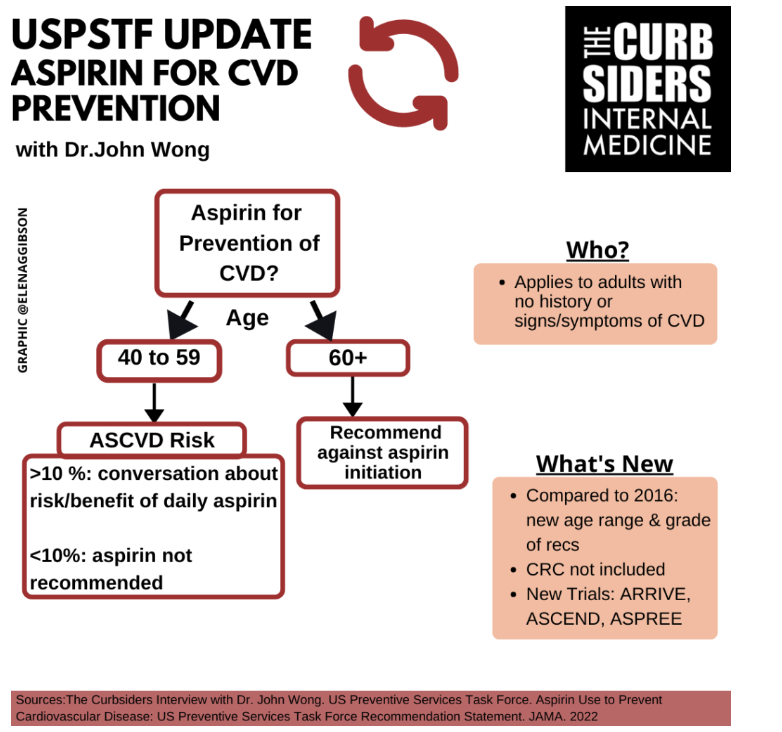In this post I link to and excerpt from The Curbsiders‘ [Link is to the episode list] #347 USPSTF Update: Aspirin for Primary Prevention of CVD.* By
*Gibson EG. Wong J. Williams PN.. “#347 USPSTF Update: Aspirin for Primary Prevention of CVD”. The Curbsiders Internal Medicine Podcast. https://thecurbsiders.com/episode-list Final publishing date, July 27 2021.
All that follows is from the above resource.
Transcript-The-Curbsiders-347-Aspirin.docx
Review the updated 2022 United States Preventive Task Force (USPSTF) guidelines on aspirin use to prevent cardiovascular disease (CVD) with Dr. John Wong.
USPSTF Aspirin for CVD Prevention Pearls
- Aspirin for primary CVD prevention should be considered for adults 40-59 with a 10-year risk of CVD > 10%
- Aspirin should not be initiated for primary CVD prevention in adults >60 years old due to risk of bleeding.
- There is insufficient evidence to evaluate the benefit/risks of aspirin on CRC incidence or mortality
USPSTF Update: Aspirin for CVD Prevention
Overall Recommendation
The 2022 USPSTF guidelines on aspirin use for primary CVD prevention recommend (USPSTF 2022):
- 40 to 59 years with a 10-year CVD risk >10%: aspirin initiation for primary CVD prevention should be individualized with a risk vs. benefit discussion between the provider and patient
- 60 years or older: recommend against initiating aspirin for primary CVD prevention
**Applies to adults ages 40+ without a history of CVD or signs/symptoms of CVD
Benefits
Daily low-dose aspirin use is associated with a small benefit in the reduction of cardiovascular events in adults 40 years or older who are at risk of CVD, and the benefits are greater for those with a higher 10-year CVD risk score (USPSTF 2022). Overall, the pooled analysis of 11 trials completed for this recommendation found a 12% reduction in nonfatal MI or CVA but no reduction in mortality from MI or CVA (USPSTF 2022). Early studies of aspirin use for primary CVD prevention identified a 45% reduction in the risk and mortality of MI or CVA (Physicians’ Health Study 1989). Dr. Wong describes results from three landmark trials published in 2018 on aspirin as primary CVD prevention as an example of the varying results reviewed:
Harms
Aspirin use in adults has been shown to increase the risk of gastrointestinal bleeding, intracranial bleeding and hemorrhagic CVA (USPSTF 2022). This risk is particularly notable in individuals greater than 60 years old. The incidence of major bleeding risks was found to be higher in the general population than previously thought, making the therapeutic window for aspirin’s benefit as primary prevention more narrow (Selak 2018).





